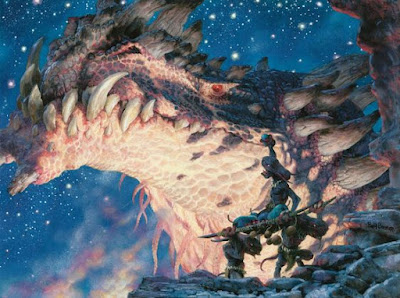I Sniff the Potion!
Here are some clues as to how to tell what a potion does. Which was inspired by this which, weirdly was inspired by something by me.
Lot's of time, players will try to sniff, sip, or otherwise examine a potion to try and see what it is without identifying it. This is a good idea and I feel should be rewarded but I don't often know how to provide proper clues in the moment without being too obvious. So here are some examples I thought up.
1d6 Potions and What they Smell, Taste, and Look like
Lot's of time, players will try to sniff, sip, or otherwise examine a potion to try and see what it is without identifying it. This is a good idea and I feel should be rewarded but I don't often know how to provide proper clues in the moment without being too obvious. So here are some examples I thought up.
1d6 Potions and What they Smell, Taste, and Look like
- Healing Potion- Sniff: It smells of home and hearth. Comforting earthy tones that are simultaneously invigorating. Sip: Tastes like coffee smells plus a heart roast or meat pie to boot. Look: Usually in a red glass vial or dyed red for ease of use. Otherwise, it's a milky sunset colored liquid like Thai tea.
- Potion of Polymorph- Sniff: The smell radically shifts to opposite ends of the scent spectrum even with a single sniff. Sip: The flavor goes from incredibly bitter to sweet to sour to salty all in an instant. Look: The potion roils within its vial, gradually but constantly changing colors.
- Deadly Poison- Sniff: Acrid, probably inducing a coughing fit. Sip: Incredibly bitter. Tasting this probably deals at least 1d3 damage on a failed Save. Look: Black, soupy, and bubbling.
- Potion of Sight/Darkvision/Something Like That- Sniff: Like a zap to the brain, leaving a tingling in your eyeballs, like a deep breath on a bitterly cold day. Sip: Tastes like carrots and mint. Look: Eyes float in a bluish mixture with orange chunks.
- Potion of Freezing- Sniff: Like inhaling the vapors of dry ice. Sip: Really cold. Your tongue or lips might be frozen solid for a bit. Look: An icy blue. Looks like a slushy.
- Potion of Fire Resistance- Sniff: Smells like sweat and dust on a hot day. Sip: Tastes like the most refreshing glass of lemonade or iced tea after a hard day of work in the fields. Look: A warm earthy amber liquid, glowing gently like a campfire.
The basic idea with all of this is that if you want players to be able to sort out or have a clue about the kind of potion they are getting, try to match the appearance, smell, and taste to the function of the potion. They may not always get the right idea, but you might give them some idea of what to expect when they down or throw the thing.
This could apply to lots of things. What kind of casing does the spell scroll come in? If it's bound by a fiery orange-red ribbon, it's probably a fireball spell or something like that. Is that amulet cold to the touch with an icy cold diamond at its center? Probably something to do with ice. Is the magic sword bone white, with its hilt bound up in mummy wrappings? Probably some kind of wraith blade or necromantic weapon.
The issue is usually that potions, magic items, and the like are often pretty weird or have difficult to define purposes, plus realism would usually dictate that form doesn't always relate to function in ways easily understood by the player characters. However, if you don't care about any of that, I think this could be rewarding for inquisitive players.
The issue is usually that potions, magic items, and the like are often pretty weird or have difficult to define purposes, plus realism would usually dictate that form doesn't always relate to function in ways easily understood by the player characters. However, if you don't care about any of that, I think this could be rewarding for inquisitive players.



I think you would want to in some way either directly or within the narrative make the players aware that the look/smell/taste of a thing may indicate its function in order to get the most out of it, but I think it's a cool idea. It would certainly help with immersion and worldbuilding, maybe even in ways which would persist in other contexts. You could also make it something specific to some single dungeon, with puzzles heavily themed around it, if it's overly limiting for a whole setting / campaign.
ReplyDeleteYeah I figure this is something that your magic-types just know
Delete